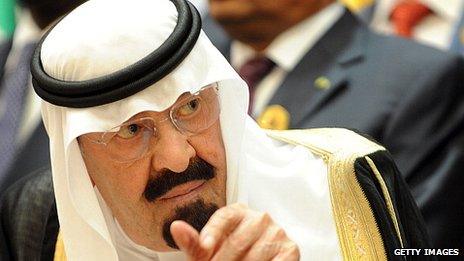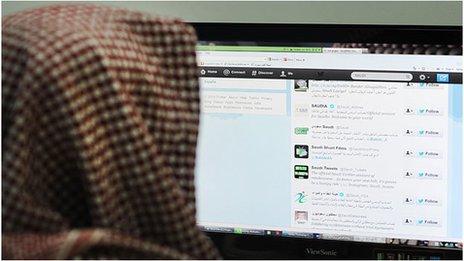Frank Gardner's return to Saudi Arabia
- Published
BBC Security Correspondent Frank Gardner in Riyadh for the first time since 2004
The Arab Spring seemed to pass Saudi Arabia by. Though its human rights record has been criticised and youth unemployment is rising, the ruling family retains absolute power. But BBC Security Correspondent Frank Gardner, critically injured in a militant attack there nine years ago, found subtle signs of change on his first trip back.
It's late afternoon in Riyadh, about the same time of day we got attacked here nine years ago.
I try not to think about that as I wheel off the plane into the capital's futuristic airport.
Already, I can sense a palpable difference from my last visit. In the cavernous arrivals hall there are international coffee shops, Western travellers in shorts, I even catch a Customs man smiling.
The murderous insurgency that took so many lives here in the mid-2000s, including that of my cameraman Simon Cumbers, has been largely defeated, its militants killed, arrested or driven over the border into the desert wildernesses of Yemen.
It's dark by the time my taxi pulls up at the shopping district of Riyadh, where I join the rest of my team. Beneath the soaring Faisaliya Tower, a skyscraper shaped like a fountain pen that's become one of the defining landmarks of this modern city, a neon sign reads Harvey Nichols.
Inside the air-conditioned arcade Saudi couples stroll past boutiques selling designer fashion labels and lacy underwear. A shop window advertising a range of Western family clothing has the faces pixellated, a nod to the country's puritanical clerics who see representation of the human image as un-Islamic.
The whole scene is, in a way, a microcosm of the contradictions this country faces.
As the world's biggest oil producer and exporter, Saudi Arabia is awash with money, yet it cannot find anything like enough jobs for its citizens. Its hereditary, unelected rulers are having to tread a difficult tightrope between, on the one hand, the forces of progress and modernity that would like to see this country become more integrated with the rest of the world, and on the other, the religious conservatives who are deeply suspicious of any change.
It is an open secret that the ageing King Abdullah would like to lift the ban on women driving but he is afraid of the backlash this would cause amongst the clerics.
So how is it that Saudi Arabia, a country where all the real power rests with a single family, the Al-Saud, has so far resisted the turbulent forces of the Arab Spring?
Well money is one reason. As unpopular Arab presidents were toppled in Egypt and Tunisia two years ago, the king reacted with surprising speed, announcing a multi-billion-dollar package of benefits for his citizens. Critics say he was simply buying their loyalty but the truth is more complicated than that.

Whatever criticisms Saudis have of their government - and corruption and waste are perhaps chief among these - most citizens, I have found, feel an extraordinary affection for their king.
As one of the dwindling number of surviving sons of the country's original founder, Ibn Saud, King Abdullah is head of the most powerful tribe in the country. If the Al-Sauds were to be overthrown, citizens fear the chaos that could follow. When they look beyond their borders at what is happening in Syria, they simply shudder.
There is also the fear factor. Street protests are strictly forbidden, and anyone calling for an elected parliament and a constitutional monarchy, as opposed to an absolute one, quickly finds themselves in trouble.
And yet there is now a new outlet for the frustrations of ordinary Saudis that the government seems unable to control - social media.
On Twitter, on Facebook, on YouTube, Saudis are speaking their minds openly in a way that was unthinkable a few years ago. And there's an added ingredient that one might not expect to find in this outwardly austere country - humour.

In a film studio in Riyadh I meet Fahad Al-Butairi. He's a 20-something US-educated graduate whose short, snappy film clips poke fun at the absurdity of everyday situations. Dressed in a baggy shirt and designer brand trainers, he shows me one he's made about corruption.
"Yes, it's lights out for you evildoers," he says on the screen with mock severity. "The Anti-Corruption Committee is coming to get you." Mock flames consume the screen and there's the sound effect of an explosion.
Fahad then proceeds to describe how ineffective he believes the committee is at stopping real corruption. In a country without cinemas, Saudis are voracious consumers of films on YouTube, however trivial. Some of his shows get over 50 million hits online, and some of the hits even come from ruling princes.
This is, in a way, the Saudi version of the Arab Spring. Apart from occasional and violently suppressed protests by the Shia minority in Eastern Province, this country has been spared the deadly violence that has wracked much of the Middle East.
Instead, it is experiencing a healthy explosion of free discussion, criticism and satire on the internet.
So far, the state is tolerating it as long as nobody insults Islam or the king, and as long as cyber-protest does not cross over into the street.
But if that crossover ever happens and police confront sizable protests from the mainstream Sunni population, the delicate balance between ruler and ruled is likely to be severely tested.
You can follow the Magazine on Twitter, external and on Facebook, external